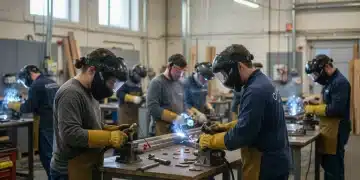Vocational training programs for adults: a path to success

Vocational training programs for adults provide practical skills and hands-on experience, facilitating career advancement and improving employability in various industries.
Vocational training programs for adults are an excellent way to gain new skills and improve career prospects. Have you ever thought about how these programs can enhance your employability and open new doors? Let’s dive into the world of vocational training and explore its advantages.
Understanding vocational training programs
Understanding vocational training programs is essential for adults looking to enhance their skills and career potential. These programs offer practical knowledge and hands-on experience, making them a valuable resource for anyone aiming to succeed in a competitive job market. By focusing on specific trades or professions, vocational training equips individuals with the tools they need to excel.
What are vocational training programs?
Vocational training programs are specialized educational courses designed to teach specific skills related to particular careers. They cover a wide range of fields, including healthcare, technology, construction, and culinary arts. Participants engage in both classroom instruction and practical exercises to prepare for real-world job demands.
Benefits of vocational training
- Targeted skill development for specific jobs.
- Shorter duration compared to traditional degrees.
- Opportunities for certifications and licensing.
- Higher employability rates due to practical experience.
Many programs offer flexible schedules, allowing adults to balance their education with work or family obligations. This accessibility is crucial for those who may not be able to commit to a four-year college degree. In addition, vocational training programs often include internships or job placement assistance, further facilitating entry into the job market.
As industries continue to evolve, the demand for skilled workers has never been higher. By investing in vocational training, adults can open doors to new opportunities, enhance their earning potential, and build fulfilling careers. This educational route not only empowers individuals but also contributes to a stronger economy, as skilled workers are essential for innovation and growth.
Importance of vocational training for adults
The importance of vocational training for adults cannot be overstated. As the job market continues to change, many adults seek ways to enhance their skills. These training programs provide vital opportunities to learn and adapt to new industries, ensuring that they remain competitive.
Why vocational training matters
Vocational training enhances job prospects by teaching relevant skills directly applicable to various careers. This training equips participants with up-to-date knowledge about the latest technologies and industry trends. Businesses are often looking for skilled workers who can step into roles without extensive on-the-job training. Thus, individuals who complete vocational programs have a significant advantage.
Key benefits of vocational training
- Offers practical, hands-on experience.
- Allows for quicker entry into the workforce.
- Facilitates career changes or advancements.
- Provides a pathway for obtaining industry certifications.
In addition, these programs often focus on areas with a high demand for skilled workers. For example, fields like healthcare, technology, and trade skills typically experience consistent growth, creating a steady need for trained professionals. Adults who pursue vocational training not only benefit personally in their career prospects but also help meet crucial labor market demands.
Moreover, vocational training develops essential soft skills such as teamwork, communication, and problem-solving. These skills are highly valued by employers and enhance overall employability. As a result, adults who engage in vocational training often find themselves better prepared for the dynamic nature of the job market.
How to choose the best vocational training

Choosing the best vocational training program is a crucial step for adults looking to advance their careers. With numerous options available, it can feel overwhelming. However, understanding what to consider can help simplify the decision-making process.
Assess your career goals
Start by identifying your personal and professional goals. What skills do you want to learn? Which industries interest you? Having a clear vision of your objectives will guide you towards the right program. Make a list of the top industries you are passionate about and explore the training programs available in those fields.
Evaluate program offerings
Next, examine the specific courses and skills offered by different vocational schools. Look for programs that provide both theoretical knowledge and practical experience. Furthermore, check if they offer certifications that are recognized by employers in your desired field. Some key aspects to consider include:
- Hands-on training opportunities
- Experienced instructors with industry backgrounds
- Internship or job placement programs
- Flexible scheduling options
It’s essential to find a program that aligns with your learning style. Some people thrive in interactive, hands-on settings, while others may prefer a more traditional classroom approach. Research the teaching methods used in each program.
Another vital factor is the location of the training center. Choosing a nearby institution can significantly reduce commuting time and costs. Additionally, consider whether online courses might be a suitable option for you, as they offer flexibility and convenience.
Read reviews and ask for recommendations
Before making a final decision, take the time to read reviews from former students. Understand their experiences and how the program helped them in their careers. You can also ask friends, family, or colleagues for recommendations. Personal insights can provide valuable information.
Finally, visit the schools you are interested in. Take advantage of open houses or tours to get a feel for the environment and ask any questions you might have. By following these steps, you can make an informed decision about which vocational training program is the best fit for you and your career aspirations.
Benefits of hands-on experience
Hands-on experience is a key component of vocational training programs for adults. Engaging directly with tools and techniques allows students to grasp concepts more deeply. This practical approach not only reinforces learning but also builds confidence in applying skills in real-world situations.
Learning by doing
One of the most significant advantages of hands-on training is that it facilitates active learning. Instead of passively receiving information, students actively apply what they learn. This engagement helps solidify their knowledge and equips them with the necessary skills for their chosen field. For instance, in fields like healthcare or automotive repair, being able to practice essential skills directly is invaluable.
Immediate feedback
When participating in hands-on activities, learners receive immediate feedback from instructors or peers. This feedback loops allow them to understand their mistakes and correct them quickly, reinforcing learning. It also creates a supportive environment where students can ask questions and seek clarification, fostering a culture of continuous improvement.
Increased employability
Employers often seek candidates who have practical experience. The more hands-on experience a student accumulates during their training, the more appealing they are to potential employers. This experience showcases their ability to adapt and perform in the workplace. Additionally, many vocational programs include internships or practical projects, giving students a chance to build their resumes while still learning.
Moreover, hands-on experience enhances problem-solving skills. Encountering real-life challenges during training prepares individuals for similar situations in their jobs. This preparation leads to more adept professionals who can handle the demands of their roles effectively.
In summary, the benefits of hands-on experience in vocational training programs are numerous. From promoting deeper understanding to boosting employability, practical training is essential for successful career development. By actively participating in their education, students establish a strong foundation for their future professional endeavors.
Success stories from vocational training graduates
Success stories from vocational training graduates highlight the real-world impact these programs can have on individuals’ lives. Many graduates have transformed their careers and achieved remarkable goals through their training. These stories illustrate how vocational education can lead to fulfilling job opportunities and personal growth.
Inspired change
For instance, consider John, who was working in a low-paying retail job. He decided to enroll in a vocational training program in information technology. After completing the program, he obtained a certification in networking. John quickly found a position as a network technician, tripling his income and gaining a sense of pride in his work. His journey shows how vocational training can lead to significant changes in personal and financial circumstances.
Career advancements
Similarly, Maria pursued a vocational program in culinary arts. With passion and dedication, she mastered essential cooking techniques. After graduating, Maria secured a job at a highly regarded restaurant. Within two years, she advanced to a sous-chef position, leading her own team. Her success exemplifies how vocational training not only provides skills but also opens doors to professional growth. Many graduates experience career advancements and find satisfaction in their chosen fields.
Community contributions
Graduates also often give back to their communities. After completing her vocational training in health care, Lisa became a certified nursing assistant. She now works with elderly patients, providing care and companionship. Lisa’s contributions have made a significant impact on her community, demonstrating the broader benefits of vocational education.
These success stories serve as powerful reminders of the potential for change through vocational training. With determination and the right skills, graduates can reshape their futures. Their experiences motivate others to pursue similar paths, reinforcing the value of practical education in today’s job market.
FAQ – Frequently Asked Questions about Vocational Training Programs
What are vocational training programs?
Vocational training programs provide hands-on education and skills for specific careers, often leading to certifications.
How can vocational training improve my job prospects?
Vocational training equips you with practical skills that employers value, often making graduates more competitive in the job market.
Are there flexible options for attending vocational training?
Many vocational programs offer flexible scheduling, including evening and online classes, to accommodate working adults.
Can I get financial assistance for vocational training programs?
Yes, many vocational schools offer financial aid, scholarships, or payment plans to help students afford their education.





